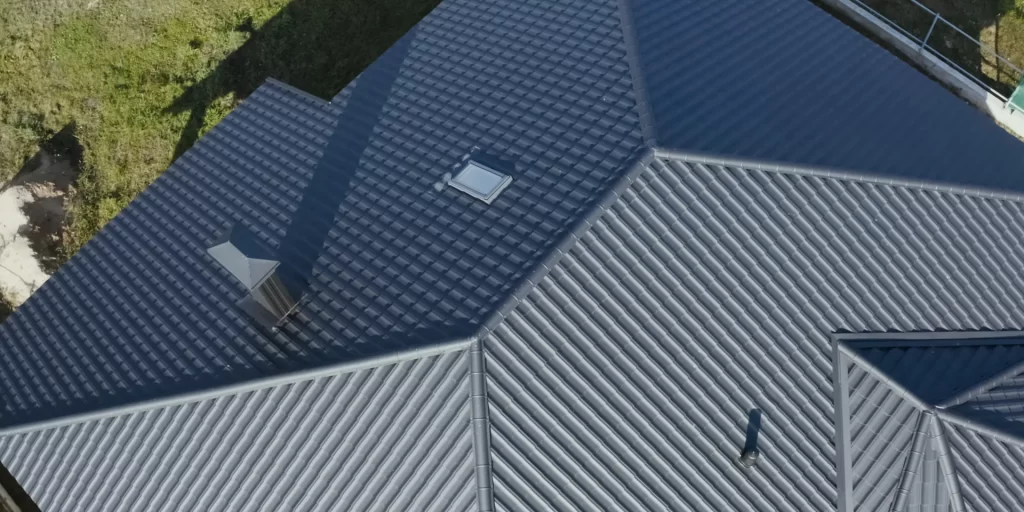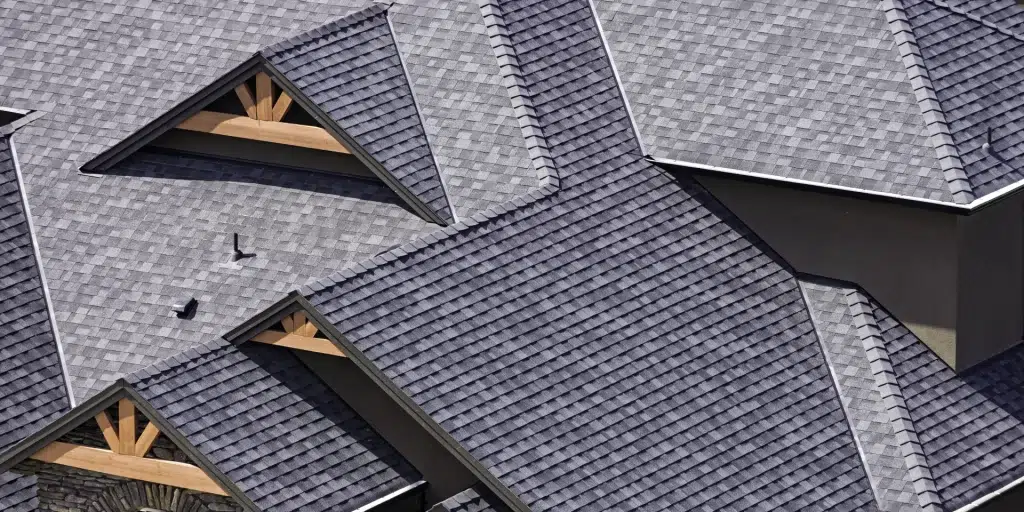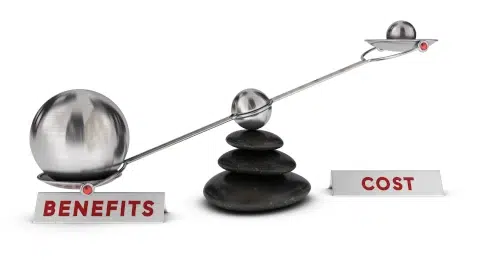You may have heard the buzz about metal roofing as an alternative to traditional shingles. While both options have their merits, your decision can have a significant impact on your home’s aesthetics, durability, and maintenance costs. In this 2023 guide, we’ll help you make an informed choice for your next roofing project. Let’s explore together the pros and cons of metal and traditional shingle roofs.
Metal Roof vs. Shingle Roof: A Comparison
Metal Roof
Pros:
- Durability: Metal roofs are renowned for their exceptional durability and longevity. They can last 50 years or more, outlasting many other roofing materials.
- Low Maintenance: Metal roofs require minimal maintenance. They are resistant to rot, insects, mold, and mildew.
- Energy Efficiency: Metal roofs are highly reflective, which helps reduce heat absorption. This can lead to lower energy bills, keeping your home cooler in the hotter weather.
- Weather Resistance: Metal roofs are excellent at withstanding harsh weather conditions, including heavy rain, snow, hail, and strong winds. They are also fire-resistant, adding an extra layer of safety to your home.
- Environmental Friendliness: Metal roofing materials are often recyclable, making them an eco-friendly choice. You can recycle them at the end of their life cycle, reducing the environmental impact.
- Variety of Styles: Metal roofs come in various styles, colors, and finishes. This allows you to choose a look that complements your home’s aesthetic.
Cons:
- Initial Cost: Metal roofs can be more expensive to install compared to shingle roofs. However, their long lifespan often offsets the initial investment.
- Noise: Some people find that metal roofs can be noisy during heavy rain or hailstorms. However, proper insulation can help mitigate this issue.
- Dent Risk: While metal roofs are durable, they can be susceptible to dents from heavy objects like falling branches or large hail.

Shingle Roof
Pros:
- Affordability: Shingle roofs are generally more budget-friendly at initial installation, making them an attractive option for many homeowners.
- Wide Variety: Asphalt shingles are available in a wide range of colors and styles. This allows many homeowners to achieve their desired look for their home.
- Ease of Installation: Shingle roofs are generally easier to install, which can save on labor costs.
- Repairability: In case of damage, individual shingles can be easily replaced, making repairs more straightforward and cost-effective.
- Noise Insulation: Shingle roofs are quieter than metal roofs during rain or hailstorms. This can be a significant advantage for some homeowners.
Cons:
- Limited Lifespan: Shingle roofs have a shorter lifespan compared to metal roofs. They typically last 20-30 years and may require more frequent roof replacement.
- Maintenance: Shingle roofs may require more regular maintenance, including cleaning and the replacement of damaged shingles.
- Less Energy Efficient: Shingle roofs tend to absorb more heat, potentially leading to higher cooling costs in hot weather.
- Susceptible to Weather Damage: Shingle roofs are strong enough to withstand moderate weather conditions. However, they are more susceptible to damage from severe weather events like hurricanes or heavy hail.

Metal vs. Shingle Roof: Cost Comparison
The cost of your roofing project is a critical factor in your decision-making process. While metal roofs tend to have a higher initial cost, they also provide long-term savings and benefits. Here’s a breakdown of the cost differences:
Cost of Metal Roof
The cost of a metal roof can vary widely depending on several factors, including:
- Materials: The type of metal used for your roof (e.g., steel, aluminum, copper) will impact the cost. Copper is the most expensive option, while steel is more budget-friendly.
- Roof Size: The size of your roof and its complexity (e.g., steep slopes, multiple angles) will affect the overall cost.
- Installation Complexity: If your roof requires extensive preparation or removal of an existing roof, the installation cost will be higher.
- Labor Costs: Labor costs can vary by location and the experience of the roofing contractor you hire.
- Additional Features: Roofing accessories such as insulation, ventilation, and underlayment can add to the overall cost.
As a rough estimate, a metal roof can cost anywhere from $7 to $12 per square foot, including materials and labor. While this may be higher than shingles, the longevity and durability of metal roofing can result in cost savings over time.
Cost of Shingle Roof
The cost of a shingle roof is typically lower than a metal roof. However, similar to metal roofing, several factors can influence the cost, including:
- Shingle Type: Asphalt shingles are the most common and affordable option. Premium shingles like architectural or designer shingles will cost more.
- Roof Size and Complexity: The size and shape of your roof can impact the cost. A more complex roof design may require additional labor and materials.
- Labor Costs: As with metal roofing, labor costs will vary depending on your location and the roofing contractor’s experience.
- Underlayment and Accessories: The cost of underlayment, ventilation, and other roofing accessories will be added to the total.
On average, you can expect to pay between $3 and $7 per square foot for an asphalt shingle roof, including installation. Keep in mind that while the initial cost is lower, shingle roofs need maintenance and replacement more often than metal roofs. This potentially results in higher long-term costs.
Making the Right Choice
The decision between a metal roof and a shingle roof ultimately depends on your specific needs, budget, and preferences. To make an informed choice, consider the following factors:
- Budget: If your budget is a significant concern, asphalt shingles may be the more cost-effective option initially. However, consider the long-term costs and potential for more frequent maintenance.

-
-
-
- Durability: If you plan to stay in your home for many years, durability and longevity are likely important to you. In this case, a metal roof may be the better investment.
- Climate: Consider your local climate and weather conditions. Metal roofs excel in areas prone to extreme weather, while shingles may suffice in milder climates. Metal roofs may also provide additional energy cost savings in areas prone to hotter conditions.
- Aesthetic Preferences: You likely have an idea of the aesthetic you want for your home. Both metal and shingle roofs offer a variety of styles and colors. Choose the one that complements your home’s design.
- Maintenance: Assess how much time and effort you’re willing to dedicate to roof maintenance. Metal roofs generally require less maintenance than shingle roofs, giving you more time for other things.
- Environmental Impact: If you’re environmentally conscious, the sustainability of your roofing material may be important to consider. Metal roofs are generally more eco-friendly.
- Noise Tolerance: Think about how noise from rain or hail might affect your comfort. Keep in mind, your roofing contactor can mitigate the metal noise factor during installation. However, shingle roofs may be the quieter option.
- Resale Value: If you plan to sell your home in the future, you’ll want to maximize your profit. The durability and longevity of a metal roof may increase your home’s resale value.
- Local Building Codes: Check with local building codes and regulations to ensure your choice of roofing material meets the necessary requirements.
-
-
Time to Upgrade Your Roof
Choosing between a metal roof and shingle roof is a significant decision. It can impact your home’s appearance, durability, and long-term costs. While metal roofs offer impressive durability, longevity, and energy efficiency, they come with a higher initial cost. On the other hand, shingle roofs are more budget-friendly initially but may require more frequent repair and replacements.

Ultimately, the right choice depends on your specific circumstances and priorities. Consider your budget, climate, aesthetic preferences, and long-term plans for your home. Consulting with a professional roofing contractor can also provide valuable insights and help you make an informed decision. Both the sleek and modern look of a metal roof or the traditional charm of shingles is a viable option.
Your choice should align with your goals for your home’s roof in the years to come.
At the end of the day, whether you choose a metal or shingle roof involves a balance between upfront costs and long-term benefits. Evaluate your budget, climate, and aesthetic preferences to make an informed decision for the needs of your home. Whichever option you choose, investing in a quality roofing installation is essential for the longevity and performance of your roof. For more information or a free estimate, Contact Us.


